
JEWISH SOCIAL STUDIES
Scope & Guideline
Cultivating rigorous research in the humanities of Jewish Studies.
Introduction
Aims and Scopes
- Interdisciplinary Approaches to Jewish Studies:
The journal embraces a variety of methodologies, including historical analysis, sociological inquiry, literary criticism, and cultural studies, to provide a comprehensive understanding of Jewish life. - Focus on Historical Contextualization:
It emphasizes the importance of situating Jewish experiences within broader historical frameworks, exploring how socio-political and cultural dynamics influence Jewish communities. - Exploration of Jewish Identities and Cultures:
The journal examines the complexity of Jewish identities, considering factors such as ethnicity, nationality, religion, and gender, and how these intersect in various cultural expressions. - Engagement with Contemporary Issues:
The journal addresses contemporary themes relevant to Jewish communities today, including migration, assimilation, and the impact of technology on Jewish practices. - Critical Examination of Antisemitism and Social Justice:
A consistent focus on the historical and contemporary manifestations of antisemitism, as well as the journal's commitment to discussions around social justice and activism within Jewish contexts.
Trending and Emerging
- Queer Studies and Jewish Identity:
The emergence of articles addressing queer perspectives within Jewish studies reflects a broader acknowledgment of LGBTQ+ identities and experiences in Jewish contexts. - Memory Studies and Holocaust Narratives:
There is an increasing focus on how memory and trauma shape Jewish identities, particularly in relation to the Holocaust, emphasizing the importance of collective memory in contemporary Jewish life. - Cultural Production and Media Representation:
The journal has seen a rise in topics related to the representation of Jews in various media forms, exploring how these representations influence public perceptions and cultural narratives. - Global Jewish Experiences:
Emerging themes highlight the experiences of Jewish communities outside of traditional centers, such as in the Middle East and North Africa, showcasing the diversity of Jewish life globally. - Intersections of Race and Judaism:
New discussions surrounding the intersections of race, ethnicity, and Jewish identity are gaining traction, indicating a broader engagement with issues of race within Jewish studies.
Declining or Waning
- Traditionalist Perspectives:
There has been a noticeable decrease in articles focusing solely on traditionalist views within Jewish practice, suggesting a shift towards more progressive and contemporary interpretations. - Narrow Historical Narratives:
Research focusing on very localized or narrowly defined historical narratives appears less frequently, indicating a trend towards broader, more integrative approaches to Jewish history. - Static Representations of Jewish Identity:
Discussions that treat Jewish identity as a monolithic concept are diminishing, reflecting a growing recognition of the diversity and fluidity of Jewish identities.
Similar Journals
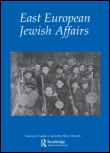
East European Jewish Affairs
Bridging Histories: A Scholarly Journey into East European Jewish AffairsEast European Jewish Affairs is a prominent scholarly journal published by Routledge Journals, Taylor & Francis Ltd, dedicated to exploring the intricate historical, cultural, and political dynamics of Jewish communities in Eastern Europe. With ISSN 1350-1674 and E-ISSN 1743-971X, this journal has been a critical platform for academic discourse since its inception in 1992, resuming publication after a hiatus in 2005. Although it is not an open-access journal, it provides vital insights into Jewish studies, engaging researchers, professionals, and students alike with in-depth analyses and discussions. The journal currently holds a Q4 ranking in multiple categories, including Cultural Studies, History, and Political Science and International Relations, reflecting its niche yet significant contribution to these fields. The 2023 Scopus rankings position it within the 34th percentile in History and the 10th percentile in Political Science, evidencing its specialized focus and the evolving nature of Jewish studies. For those investigating the unique social and cultural trajectories of East European Jewish communities, East European Jewish Affairs serves as an essential resource.
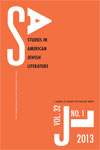
Studies in American Jewish Literature
Connecting Heritage and Modernity in Jewish LiteratureStudies in American Jewish Literature, published by Penn State University Press, is a premier academic journal that delves into the rich tapestry of Jewish literary expression in America. With an ISSN of 0271-9274 and an E-ISSN of 1948-5077, this journal serves a vital role in the fields of Literature and Literary Theory, Cultural Studies, and Anthropology, as evidenced by its placement in the Q1 to Q3 quartiles across various categories in 2023. The journal is a key platform for researchers, professionals, and students interested in exploring the intersection of Jewish identity and American literature, contributing to a deeper understanding of cultural narratives and societal impacts. The publisher's commitment to scholarly excellence ensures that each issue is meticulously curated, showcasing innovative research and critical analysis. While not open access, the journal provides essential insights for anyone engaged in the study of Jewish literature or the broader cultural dynamics at play in American society. Stay informed on contemporary themes and historical contexts that shape literary discourse through this commendable publication.

Kwartalnik Historii Zydow-Jewish History Quarterly
Exploring the Rich Tapestry of Jewish HeritageKwartalnik Historii Żydów - Jewish History Quarterly is a dedicated academic journal published by the esteemed Jewish Historical Institute in Warsaw, Poland. With an ISSN of 1899-3044, this quarterly publication serves as a vital platform for scholarly discourse on Jewish history, culture, and heritage. The journal aims to reflect the diversity and complexity of Jewish experiences across historical contexts, making it an essential resource for researchers, professionals, and students in the fields of History, Religious Studies, and Cultural Studies. Despite its recent coverage discontinuation in Scopus from 2012 to 2015, the journal's rankings within its respective categories indicate a modestly engaged readership and potential for contribution, particularly seen in its ranks of 339/388 in Religious Studies and 859/975 in History. Although the journal operates on a non-open access basis, its curated articles enrich the understanding of Jewish narratives and interactions within broader socio-cultural frameworks, underlining its importance in promoting historical knowledge and cultural appreciation.

Quest-Issues in Contemporary Jewish History
Connecting Scholars to the Heart of Jewish HistoryQuest - Issues in Contemporary Jewish History is a pivotal open-access journal published by the Fondazione Centro Documentazione Ebraica Contemporanea in Italy. Since its inception in 2010, this journal has been dedicated to the scholarly exploration of the multifaceted dimensions of contemporary Jewish history, making significant contributions to the fields of history and cultural studies. With an ISSN of 2037-741X, it serves as a vital platform for researchers, professionals, and students alike, providing access to an array of insightful articles and research findings. As of 2023, it holds a respectable Q3 ranking in the History category within Scopus, indicating its growing influence in academia, alongside a rank of #899 out of 1760 in Arts and Humanities – History. This makes it an essential resource for those looking to deepen their understanding of Jewish history in a contemporary context. The journal, with its rich scholarly outputs converging from 2017 to 2023, is based in Milan and strives to foster high-quality research in Jewish studies.
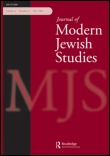
Journal of Modern Jewish Studies
Challenging Perspectives on Jewish Culture and PoliticsThe Journal of Modern Jewish Studies, published by Routledge Journals, Taylor & Francis Ltd, serves as a premier platform for scholarly discourse in the realm of Jewish studies, particularly addressing the contemporary intersections of culture, history, and political science. Established in 2002, this journal has become increasingly vital, as demonstrated by its categorization in the Q3 and Q4 quartiles across various fields, including Cultural Studies and History, showcasing its pivotal role within the academic community. Despite not being an open-access journal, it continues to maintain a robust ranking, being placed in the 74th percentile for History and 62nd percentile for Cultural Studies in the Scopus Ranks. This illustrates the journal's commitment to high-quality research and its significant contribution to understanding the complexities of modern Jewish life and traditions. Based in the United Kingdom, the journal's outreach and content are designed to engage researchers, professionals, and students who are passionate about exploring the diverse facets of Jewish identity and its implications in contemporary society.

JOURNAL OF JEWISH THOUGHT & PHILOSOPHY
Connecting Diverse Fields through Jewish Intellectual InquiryThe JOURNAL OF JEWISH THOUGHT & PHILOSOPHY, published by BRILL, stands as a significant academic resource since its inception in 1993. With the ISSN 1053-699X, this interdisciplinary journal uniquely bridges various fields including Literature and Literary Theory, Philosophy, and Religious Studies, providing a platform for rigorous exploration of Jewish intellectual traditions and their broader cultural implications. Holding esteemed rankings across multiple categories, including Q1 in Literature and Literary Theory and Q2 in Philosophy, the journal appeals to researchers and scholars worldwide. The journal is not open access but is available through numerous academic libraries, making it accessible to those dedicated to advancing knowledge in Jewish thought. By fostering critical discourse and innovative scholarship, it remains an essential resource for understanding complex intersections of faith, ethics, and society from a Jewish perspective.
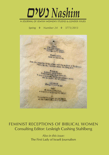
Nashim-A Journal of Jewish Womens Studies & Gender Issues
Fostering Dialogue on Gender and Jewish LifeNashim: A Journal of Jewish Women's Studies & Gender Issues, published by Indiana University Press, stands as a pivotal platform for interdisciplinary scholarship at the intersection of Jewish studies, gender studies, and cultural discourse. With an ISSN of 0793-8934 and e-ISSN 1565-5288, this journal offers a vital repository of research and critical analysis, specifically highlighting the experiences and contributions of Jewish women across historical and contemporary contexts. Although classified in Q4 of the 2023 category quartiles for Arts and Humanities, Cultural Studies, and Gender Studies, it serves to amplify underrepresented voices and themes that are crucial for understanding societal dynamics. The journal spans from 2013 to 2024 and welcomes contributions that engage thoughtfully with gender issues in Jewish contexts, making it an essential resource for researchers, educators, and students alike, who are dedicated to exploring the rich complexities within this field of study. While Open Access is not currently supported, access to its in-depth articles can be sought through institutional databases and libraries, ensuring that its impactful research reaches those who seek it.
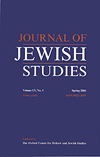
JOURNAL OF JEWISH STUDIES
Exploring the Depths of Jewish HeritageJOURNAL OF JEWISH STUDIES, published by the Oxford Centre for Hebrew and Jewish Studies, stands as a distinguished platform for scholarly discourse in the fields of Jewish history, culture, literature, and religious studies. With its ISSN 0022-2097, this journal is recognized for its significant contributions to understanding Jewish heritage and thought, achieving commendable rankings in various categories, including Q1 in Literature and Literary Theory and Q2 in History and Cultural Studies, as of 2023. The journal fosters rigorous academic engagement and encourages researchers and scholars worldwide to explore the complexities of Jewish identity and its interconnections with broader historical narratives. Operating without an open access model, it nonetheless ensures a wide reach through its well-regarded reputation, making it an essential resource for anyone invested in Jewish studies. With a publication history spanning from 2002 to 2024, the journal continues to serve as an invaluable repository of knowledge and insight for students, researchers, and professionals alike.
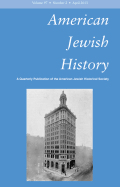
AMERICAN JEWISH HISTORY
Documenting Heritage, Inspiring Future GenerationsAMERICAN JEWISH HISTORY is a premier academic journal published by Johns Hopkins University Press, dedicated to the exploration and analysis of the Jewish experience in the American context. With ISSN 0164-0178 and E-ISSN 1086-3141, this journal serves as a vital resource for scholars and students in the fields of cultural studies, history, and religious studies, as evidenced by its placement in the Q3 quartile across these disciplines in 2023. Reaching a broad audience interested in the historical, social, and cultural dimensions of the American Jewish narrative, the journal has converged in various years, ensuring a robust collection of multidisciplinary research and discussions. Although it operates under a traditional subscription model, the journal remains an essential platform for critical analysis, fostering deeper understanding of Jewish identity and history. With Scopus rankings placing it at the 60th percentile in History and 62nd percentile in Religious Studies, AMERICAN JEWISH HISTORY stands as a respected publication that significantly contributes to the discourse surrounding Jewish history and culture in the United States.
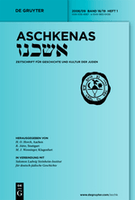
Aschkenas-Zeitschrift fuer Geschichte und Kultur der Juden
Enriching Interdisciplinary Perspectives on Jewish CultureAschkenas-Zeitschrift fuer Geschichte und Kultur der Juden, published by WALTER DE GRUYTER GMBH, is a distinguished academic journal that delves into the rich history and cultural heritage of Jewish communities. Based in Germany, this journal is indexed under the ISSN 1016-4987 and E-ISSN 1865-9438, making its contributions accessible to an international audience. Although it currently operates without open access options, the journal serves as an important platform for researchers in the fields of Arts and Humanities, History, Literature and Literary Theory, and Religious Studies, as evidenced by its publication history from 1996 to 2023. While ranked in the fourth quartile across various categories on Scopus, the journal provides critical insights and interdisciplinary approaches that enrich the understanding of Jewish cultural narratives. Researchers, professionals, and students alike will find valuable content that not only highlights historical perspectives but also engages with contemporary cultural discussions. This journal remains a vital resource for those seeking to deepen their knowledge and contribute to ongoing dialogues in Jewish studies.